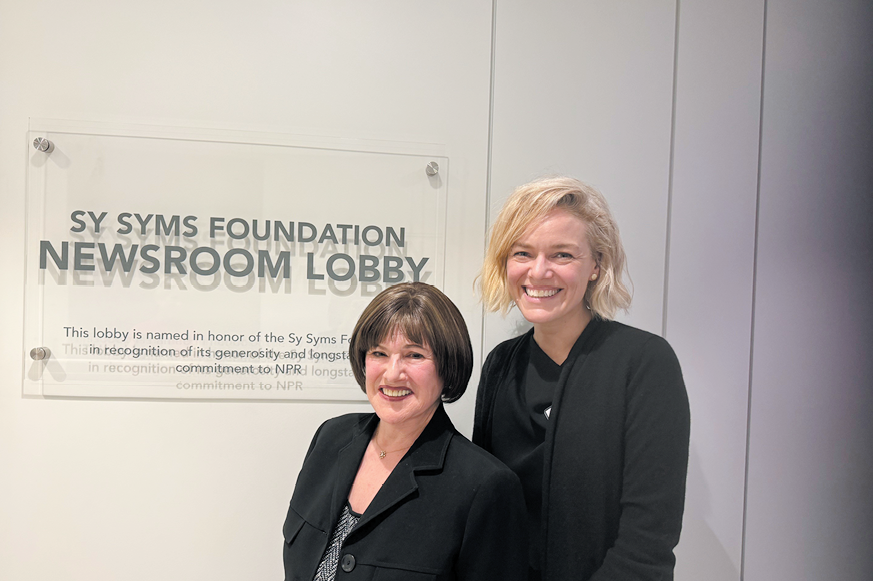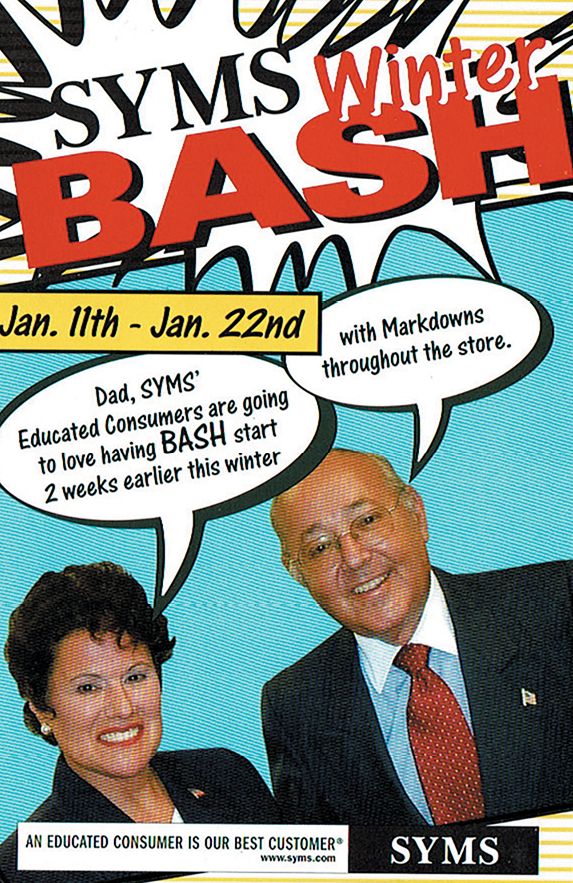- Home
- Media Kit
- MediaJet
- Current Issue
- Past Issues
- Reprints (PDF)
- Photo Specifications (PDF)
- Contact Us
- PRIVACY POLICY
- TERMS OF USE
![]()
ONLINE
![]()
ONLINE

Respect And Trust
Editors’ Note
Marcy Syms’ 35-year career in retailing culminated with the successful combination of Syms and Filene’s Basement. She and her father, Founder Sy Syms, were spokespersons for the company and created the tag line, “An Educated Consumer is our Best Customer,” a household logo. Since 2013 Syms has been a founding Organizer of the ERA Coalition and the ERA Project at Columbia Law School. Founding Trustee and President of the Sy Syms Foundation since 1985, Syms has been supporting the Sy Syms School of Business at Yeshiva University since its inception. She is a board member of The Forward and The National Public Radio Foundation. She serves on the advisory boards of the Harvard Kennedy School’s Women and Public Policy center and Carr Center for Human Rights. She is also a funder of Weizmann Institute, WNET Public Broadcasting, and countless other nonprofits making the world a better place. Syms is past Director of Benco Dental, the third largest distributor of dental supplies in the U.S., and past Director of Rite Aid Corp., American Materials, and Rebel Media. She is a former chair of the Reserve Bank of New York Small Business and Agricultural Advisory Council. She recently completed the Advanced Leadership Program at Harvard University and is a lifetime World Presidents’ Organization at large member. She serves on the advisory board of Edmond & Lily Safra Center of Ethics. A long-time columnist at Family Business Magazine and author of Mind Your Own Business and Keep It in the Family, in the fall of 2025 she will be coming out with a new book, Leading with Respect: From the Backroom to the Boardroom.

NPR CEO Katherine Maher (right) with Marcy Syms at
NPR headquarters where they named the newsroom lobby
for the Sy Syms Foundation in 2024
Will you highlight your career journey?
Starting as the daughter of a successful entrepreneur, I was early on impressed by the dedication, work ethic, and tireless optimism it takes to start or run a company. Although my father’s retail store, Syms, was immediately successful in lower Manhattan, it wasn’t at first a choice I wanted to make to join the family business. Being the eldest of six children, and with three brothers already working with my father, I pursued a career in communications. It wasn’t until Syms intended to expand outside the New York area, and my father asked me to do the media campaign for a new store in Falls Church, Virginia, that I said yes. The experience was spectacular and life-defining. I completely enjoyed the pressure of being a go-to person on the ground and even relished ordering breakfast for new hires. Anything that had to be done, I did.
After that I joined Syms and never looked back. We were a scrappy, innovative retailer on the cusp of a completely changing consumer and retail bricks-and-mortar experience. The year was 1978. Ralph Nader was making consumers and legislators aware of the importance of consumer protection, and most shoppers by the early 1980s were becoming very comfortable with discount shopping which actually started in the 1950s. But Syms needed to educate consumers about our “off-price” way of retailing, and that’ s how the tagline, “An Educated Consumer is our Best Customer,” came to be.
You have served as an independent director of public and private companies. What are the key factors you look for when deciding to take on this role?
In deciding to take on the role of a director, there are so many issues that influence a productive and worthwhile experience for both you and the company. First and foremost is the fit. Do you fit with the mission and vision of the organization, whether for-profit or nonprofit, big or small? By feeling comfortable and in alignment with the values of the organization, it is more likely you will be useful to the organization. This doesn’t mean you’re a rubber stamp. No director deserves a salary for that kind of laxness. But it does mean you will not be a useless and annoying squeaky wheel. There’s a big middle ground. Another essential is the camaraderie and compatibility and shared sense of purpose with the other board members. By doing research and gathering intelligence, through Google or gossip or both, before accepting a directorship you can see exactly who you’ll be in the room with. At the minimum you need to respect one another in order to work together for the best outcome for the organization. Some of the most productive board experiences I’ve had were with companies in industries I knew little about before joining the boards.
What was the vision for creating the Sy Syms Foundation and how do you define its mission?
The Sy Syms Foundation was established two years after we took the company public in 1983. The primary focus was to support the establishment and growth of the Sy Syms School of Business at Yeshiva University in New York City. The secondary focus was to involve the foundation with not-for-profit activities and programs in each of the markets where we had operating Syms stores. Each store manager and educator – as we called our sales team members – would suggest to us which organizations they would most like to support in the community. As a result, we became early supporters of the Juvenile Diabetes Foundation walks, the Go Red campaign of the American Heart Association aimed at improving women’s heart health, the Girl Scouts of America, and local Little League baseball teams for which we bought the uniforms and equipment. Today, the foundation continues its involvement with public broadcasting, including the Public Broadcasting Service and National Public Radio. It also makes long-term commitments in the areas of medical research, education, and the arts. We describe the mission overall as partnering with organizations to help individuals realize their own potential.

Winter Bash postcard invited Syms proprietary charge customers to
Syms, where the merchandise was always the star
Where did you develop your passion for philanthropy, and will you highlight some of the causes you support?
The germ of the idea of philanthropy came from my bubbe, Clara Glickman, who, in the many philosophical conversations we had when I was a young girl and talked about the meaning of life, told me in no uncertain terms that the purpose of your life should be to make the world a better place than how you found it. Of course, there are close-to-home issues that one can look at, but I always consider the broader community and world at large. One of the first things I became involved with independently was distributing food to those with food insecurity. When I got older and had the opportunity to work with the foundation, I found that so much of my philanthropic zeal had to do with my and my family’s need to deal with health issues that were not deeply recognized by researchers, including women’s heart health.
Do you feel that there are strong opportunities for women in C-suites and on corporate boards?
When I first got involved as the youngest woman president of a New York Stock Exchange company, I was very much the “it girl,” the focus of much attention. We have made enormous strides in the number of women in corporate boardrooms, and it has been helpful that research surrounding the changes in women’s participation at the board level has conclusively found that having at least 30 percent of your board be women is a benefit to the performance of your company. To date, the correlation between this result and access to the C-suite for women has been very spotty. A bright spot has been the area of finance, where females have thrived, but oftentimes the corporate culture allows a woman to rise to Chief Financial Officer but no further. Traditionally women have run what used to be called human resources, but that was rarely, if ever, a C-suite position. It’s a good thing that female CEOs get a lot of press, because in order to encourage females in middle management that they can make it to the top, they need to see that someone like them is doing it successfully. After years of little progress, women CEOs today make up 10 percent of Fortune 500 chief executives, inching toward the 30 percent “goal.”
What do you feel are the keys to effective leadership and how do you approach your management style?
The foundation of successful management is a combination of respect and trust. In order to be respected, you need to practice transparency, communication, and have a consistency of character. All of these just happen to also instill trust. By never asking someone to do something you wouldn’t want to do yourself, there is a compassion in your leadership that is immediately transmitted to the organization. I always had an open-door policy, always said there is no such thing as a stupid question, and I would always assume first and foremost your good intentions before questioning your motives. At Syms, where I learned and practiced and continued to master this type of management leadership, the entire corporate culture was based on the idea that we respect the intelligence of every customer that walks into one of our stores, and in order for our co-workers to behave with respect to those customers, every co-worker needed to feel respected as well.
Who are some of the mentors that influenced your career?
Looming largest in my mentor category was my father, who, by his very willingness to allow me the opportunity to learn on the job, was a mentor. Even though I was joining the family business, I brought a discipline nobody else had: media planning and public relations. It was because my father saw my curiosity and determination that he originally asked me to take over human resources, and then expanded that to real estate research and negotiations and expanded that to union negotiations. All the time I educated myself with outside sources, either courses or individuals, to gain the expertise I needed to more successfully execute in these areas. He was a life-long mentor who was also a role model in his use of compassion, generosity and perpetual optimism. When he nominated me to succeed him as CEO, it was a time of joy and gratification for both of us.
What advice do you offer to young people beginning their careers?
The advice I give today is the same advice I gave when I was seen as an advice giver – get your foot in the door. Just make sure it’s a place worth the effort to get your whole body into. Make sure that the values of the company are in sync with your personal values and ethics. And make “YES!” your go-to answer for most, if not all, requests.
With all that you have accomplished in your career, were you able to enjoy the process and take moments to celebrate the wins?
Whenever we opened a new store, it felt to me like an opening night on Broadway. All the work in all the areas that needed to get done came together, and miraculously it all worked. The doors opened, the registers rang, and people were anxious to tell others about their Syms experience. I’ve been blessed with a deep love of the arts. My mother was a professional singer, and I was exposed early on to the joys of music in all its forms. My way of celebrating a win is making sure I take time to be alone and reflect, to understand how the success may change tomorrow. I agree with Socrates that “the unexamined life is not worth living.”![]()